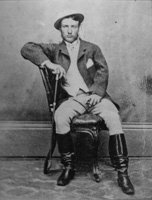I had never really considered Marcus Clarke to be much of a poet until I come across this poem - and, by that, I mean from a point of view of quantity rather than quality, having never encountered any poetry by him previously. The Australian literature resource Austlit lists 129 works by the author but only 9 poems. Granted not all possible publication sources have been indexed, but the major magazines and newspapers show that Clarke was more a novelist, journalist and playwright than poet.
So we come to Clarke's poem of a day in the life of a restaurant waiter, the first truly urban poem in the collection so far.
The eponymous waiter is given a hard time by all sections of the tavern's clientele. He is yelled at, abused, and cursed by all as he tells the story of his day. It comes across as one mad rush oorm one dish to another, from one glass or porter to a "soda and a dash". He is given little rest.
An interesting aspect of the poem is the glimpse it gives of the eating habits of the people of Melbourne in the 1870s: we see mutton chops and steak along with coffee, toast, flathead (fish), ham and beef for breakfast; and there's oxtail soup, curry, cold boiled beef, irsh stew and pickled cabbage for lunch. The poet doesn't actually detail any dinner-time fare but you get the impression that steak and oinions, pork and greens, and spirit-reared cow-heel might just be on the menu.
By the end of the day the waiter has about had it, contemplating the "hideous Babel" that he encounters in the tavern as his "soul is slowly melting" and his "brain is softening fast". Does man live only to eat, he wonders. From his perspective that's all there is: eating, shouting, drinking - like something from a Gordon Ramsay kitchen without the swearing. Or, at least, without the swearing appearing here. If he was writing today I doubt whether Clarke, or his editor, would have been so restrained.
Clarke was believed to drink heavily - which may have contributed to his early demise at the age of 35 - so we can be fairly certain that the poem is told from his experiences watching put-upon slave labour going about their work. It's a form of drudgery, I suspect, still very much in evidence today.
Text: "The Wail of the Waiter" by Marcus ClarkeAuthor bio: Australian Dictionary of Biography
 Publishing history: First published in The Bulletin on 29 September 1900, and subsequently reprinted in Freedom on the Wallaby: Poems of the Australian People (1953), The New Oxford Book of Australian Verse (1986 and 1996), and The Oxford Book of Australian Light Verse (1991).
Publishing history: First published in The Bulletin on 29 September 1900, and subsequently reprinted in Freedom on the Wallaby: Poems of the Australian People (1953), The New Oxford Book of Australian Verse (1986 and 1996), and The Oxford Book of Australian Light Verse (1991).Next five poems in the book:
"Where the Pelican Builds" by Mary Hannay Foott
"Catching the Coach" by Alfred T. Chandler ("Spinifex")
"Narcissus and Some Tadpoles" by Victor Daley
"Nine Miles from Gundagai" by Jack Moses
"The Duke of Buccleuch" by JA Philp
